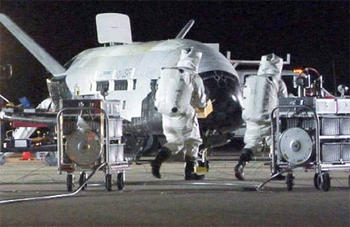California, Oct 18: A top-secret space plane landed on Friday at an Air Force base on the Southern California coast.

The plane spent nearly two years circling Earth on a classified mission. Known as the X-37B, it resembles a mini space shuttle.
It safely touched down at 9:24am on Friday, officials at Vandenberg Air Force Base said.
Just what the plane was doing during its 674 days in orbit has been the subject of sometimes spectacular speculation.
Several experts have theorized it carried a payload of spy gear in its cargo bay. Other theories sound straight out of a James Bond film, including that the spacecraft would be able to capture the satellites of other nations or shadow China's space lab.
In a written release announcing the return of the craft, the Air Force only said it had been conducting "on-orbit experiments."
The X-37B program has been an orphan of sorts, bouncing since its inception in 1999 between several federal agencies, NASA among them. It now resides under the Air Force's Rapid Capabilities Office.
The plane that landed Friday is one of two built by Boeing. This is the program's third mission, and began in December 2012.
The plane stands 9. 1/2 feet (2.9 meters) tall and is just over 29 feet (almost 9 meters) long, with a wingspan under 15 feet (4.5 meters). It weighs 11,000 pounds (4,989 kilograms) and has solar panels that unfurl to charge its batteries once in orbit.
The Air Force said it plans to launch the fourth X-37B mission from Cape Canaveral, Florida, next year.





Comments
Add new comment